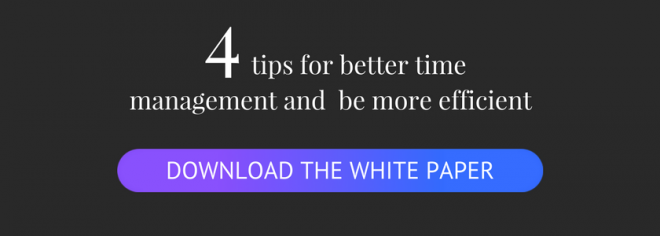Data collection, and their analysis with the help of Artificial Intelligence are making work more productive and efficient each day. But soon AI will become more autonomous and more demanding.
Not a day passes without progress in the artificial intelligence sector as it slowly becomes mainstream. There are those who are alarmed the whole thing will bring about unemployment for all. One French series, Terpalium, describes a dystopian future where AI has led to a situation in which an elite few enjoy all the joys of modern life while most of the population is in a vegetative state of misery and laziness. Others have a more optimistic view, believing that new jobs will come to replace those taken over by automated machines. But beyond arguments of the quantitative kind, AI is set to drastically transform the nature of work.
The “Quantifief Self” era
We are in the era of the “quantified self” where connected objects collect infinite amounts of data about our health and physical activity. In the professional realm, the collection of such large quantities of data, (Big Data), and their analysis with artificial intelligence is already beginning to transform the way we work. Of course, economies are made by those who get there first. For example, Uber is constantly collecting data about the mobility of its drivers and passengers. Each ride is analyzed to optimize the algorithms that guide drivers to the fastest route to get to their destination, and propose the same sharing of data for passengers going to the same location so that they can share rides. Food delivery companies do the same thing to optimize the speed at which they can serve clients.

The analysis of data for the service of all
The trend is starting to be seen in more traditional companies, where email exchanges, and data on employee performance are collected and analysed with the help of new tools such as AI.
Last July, Microsoft launched a program called Microsoft Workplace Analytics to facilitate the analysis of data for companies. When applied to sales teams, it allows companies to discover the common practices used by the best vendors, and find out what makes them successful. Companies just have adapt their salesforce with those successful methods. This also applies to the managerial sphere: Microsoft Workplace Analytics allows companies to discover which methods lead to the best engagement and motivation from employees ( one to one interviews, trust, autonomy etc). Companies can then redefine how they train their managers.
Data analytics is also about service to the individual. As such, with the help of Microsoft Workplace Analytics, workers benefit from an exhaustive analysis of their time spent at work, allowing them to see the frequency at which they are disrupted in their concentration, the time they spend in meetings each week, even overtime. They can thus have a better idea of their use of time and identify what stops them from being productive. They can then negotiate with their employers to work more efficiently, by using real time data to ask for supplementary payment for extra work hours, or less meetings that disrupt productivity and so on.

Employees can now effectively scan their email inbox, and know the exact time they spend each day writing emails, and the time it takes to read and write responses for each of their clients. An employee can then decide whether it’s useful to follow up on a contact that never opens his emails or identify the days of the week during which emails receive the most responses and adapt its use in response.
And why stop with email? Chorus is a company that analyzes calls made by sales professionals and sends workers a recap email with the choice of words that have proven most efficient to maximize the chances of making a deal. For companies looking for an ideal candidate, Textio proposes services that use its machine learning algorithms to collect thousands of job postings to help HR professionals write the perfect job listing and find the best candidate. AI can also be the best of coaches.
Towards more autonomy
With better measurement and more efficiency, work becomes more horizontal. AI allows users to automate certain tasks, specifically those having to do with employee management, administration and team coordination.
For Sydney Finkelstein, Management Professor at Darthmouth College Tuk School of Business, it is certain that managerial activities would become entirely animated :
As such, according to an Accenture study, most routine administrative and quality control tasks, such as the allocation of resources and following up on the organization of meetings will soon be assured by AI. A survey conducted by Harvard Business Review of 1,770 managers from 14 different countries make the same assumption: though today managers spend more than half of their time on administrative activities and quality control, most of these functions will soon be automated. Some companies, like Julie Desk, already propose a service for a virtual assistant, and essentially automate the entire meeting coordination process. Still others, such as BetterWorks, propose a key tool for assigning objectives and employee evaluations.
According to Bernard Marr, consultant specializing in data and technology, these kinds of tools will make systems of evaluation and retribution more fair:
The company of tomorrow will be hierarchical, and will be composed of workers supervised by processes fed by artificial intelligence. These changes led by technology combine together with trends in the current population such as the rise in independent workers ( half of Americans will be independent workers by 2020), the rise in remote working and the trend of going from mandatory presence at work, to mandatory results. Together, these elements will change the way we work.
Welcome to the era of augmented managers
Don’t panic, managers won’t disappear. In fact, in eliminating the most routine and repetitive parts of their job, AI will allow them to focus on the things they excel in, where they have real value to add as humans.
According to the authors, technology will also bring about the arrival of “augmented”managers, who will be able to use artificial intelligence and the treatment of data to orient their business decisions. They cite the example of Kensho Technologies, a company specialized in creating analysis tools for professional investors. The company is at the forefront of a tool that will allow managers to ask precise and complex questions to artificial intelligence regarding the state of the market and receive an almost instantaneous response.
What counts for these managers is the same as what counts for the active population. So that when artificial intelligence allows us to automate the most repetitive tasks, humans will be able to occupy functions that are more creative by taking advantage of their human capacities: empathy, collaboration and exchange. Tomorrow’s working world will be more interesting and gratifying, but also more difficult and demanding, with the progressive disappearance of simple, routine jobs. A challenge for professional training to address, no doubt.
What do you think? Let us know in the comments below!

